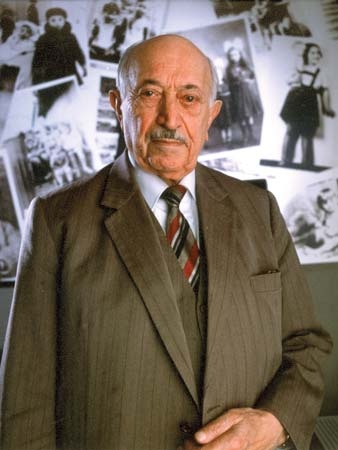Wiesenthal, Simon
Nazi-hunter
born December 31, 1908, Buczacz, Austria-Hungary 【now Buchach, Ukraine】
died September 20, 2005, Vienna, Austria
 founder and head (1961–2003) of the Jewish Documentation Centre in Vienna. Wiesenthal was a longtime Nazi-hunter who, with the cooperation of the Israeli, West German, and other governments, tracked down more than 1,000 war criminals.
founder and head (1961–2003) of the Jewish Documentation Centre in Vienna. Wiesenthal was a longtime Nazi-hunter who, with the cooperation of the Israeli, West German, and other governments, tracked down more than 1,000 war criminals.Wiesenthal received a degree in architectural engineering from the Technical University of Prague (1932) and settled in Lwów, Poland (now Lviv, Ukraine). When the city was seized by the Soviet Union in 1939, he had to close his “bourgeois” architectural practice but avoided being exiled to Siberia by bribing a commissar of the NKVD (Soviet secret police). After the Germans replaced the Soviet occupiers at Lwów in 1941, he was dragooned into forced labour and spent the last three years of the war evading death in a series of labour and concentration camps. Wiesenthal was a prisoner at Mauthausen when the camp was liberated in 1945. Eighty-nine members of his and his wife's Jewish families were killed by the Nazis, but, after the end of World War II, he and his wife (who had managed to pass as a Pole for much of the war) were reunited.
As soon as he had recovered his health, Wiesenthal began helping the U.S. Army gather evidence with which to prosecute Nazi war criminals. In Linz, Austria, in 1947, he and 30 volunteers opened the Documentation Centre on the Fate of Jews and Their Persecutors for the purpose of aiding Jewish refugees and providing evidence for war crimes trials. In 1954 the Linz office closed and its files were conveyed to Israel, but Wiesenthal continued on his own to ferret out former Nazis. He helped locate Adolf Eichmann (Eichmann, Adolf), who was arrested in 1960 in Argentina. The following year Wiesenthal opened the Jewish Documentation Centre in Vienna and, over the years, sought out Gestapo agents, SS officers, and other Nazis for trials, principally in West Germany. In 1967 he was primarily responsible for locating Fritz Stangl, the former commandant of the Treblinka and Sobibor death camps. In 1977 he helped establish the Simon Wiesenthal Center, which sought to preserve the memory of the Holocaust while also combating racism, anti-Semitism, and genocide. Headquartered in Los Angeles, the organization later opened offices around the world. In 2003 Wiesenthal announced his retirement from the Jewish Documentation Centre.
Wiesenthal wrote a number of books, including KZ. Mauthausen (1946; “Concentration Camp Mauthausen”), Ich jagte Eichmann (1961; “I Hunted Eichmann”), Verjährung (1964; “Statute of Limitations”), The Murderers Among Us: The Simon Wiesenthal Memoirs (1967), Segel der Hoffnung (1972; Sails of Hope), and Der Fall Jaworska (1975; “The Case of Jaworska”). He received numerous awards, including the U.S. Congressional Gold Medal (1980) and the French Legion of Honour (1986). In 2004 he was made an honorary knight.
- Kellogg, John Harvey
- Kellogg, Louise Phelps
- Kellogg, W K
- Kells, Book of
- Kelly Clarkson
- Kelly, Ellsworth
- Kelly, Emmett
- Kelly, Gene
- Kelly, George
- Kelly, Grace
- Kelly, Hugh
- Kelly, John B.
- Kelly Johnson
- Kelly, Machine Gun
- Kelly, Ned
- Kelly, R.
- Kelly, Walt
- Kelly, William
- keloid
- Kelowna
- kelp
- kelp crab
- Kelsen, Hans
- Kelsey Grammer
- Kelsey, Henry